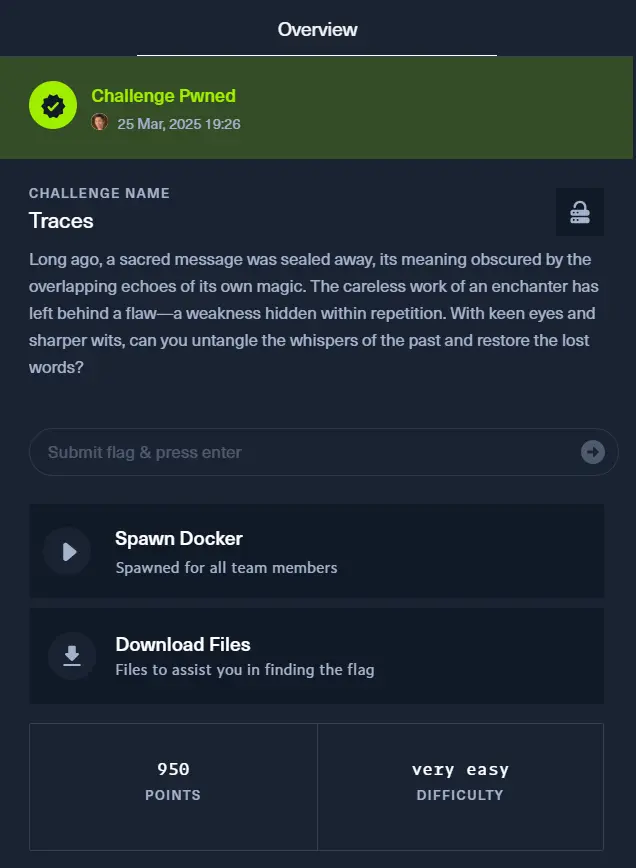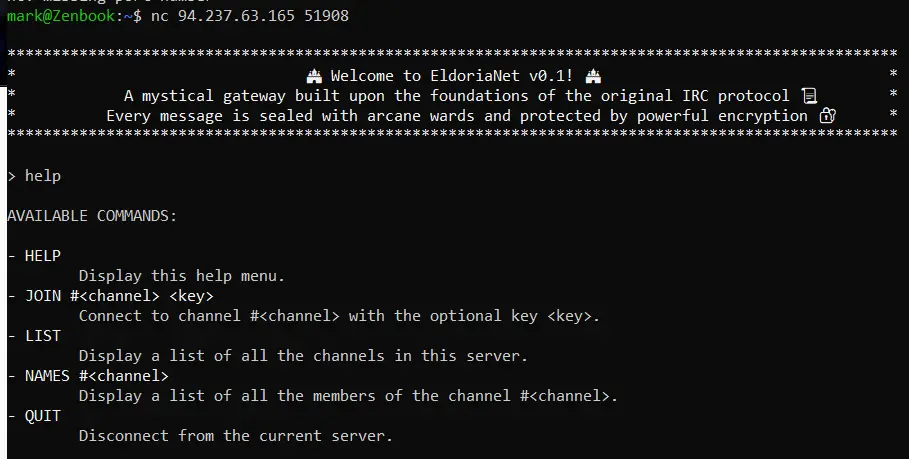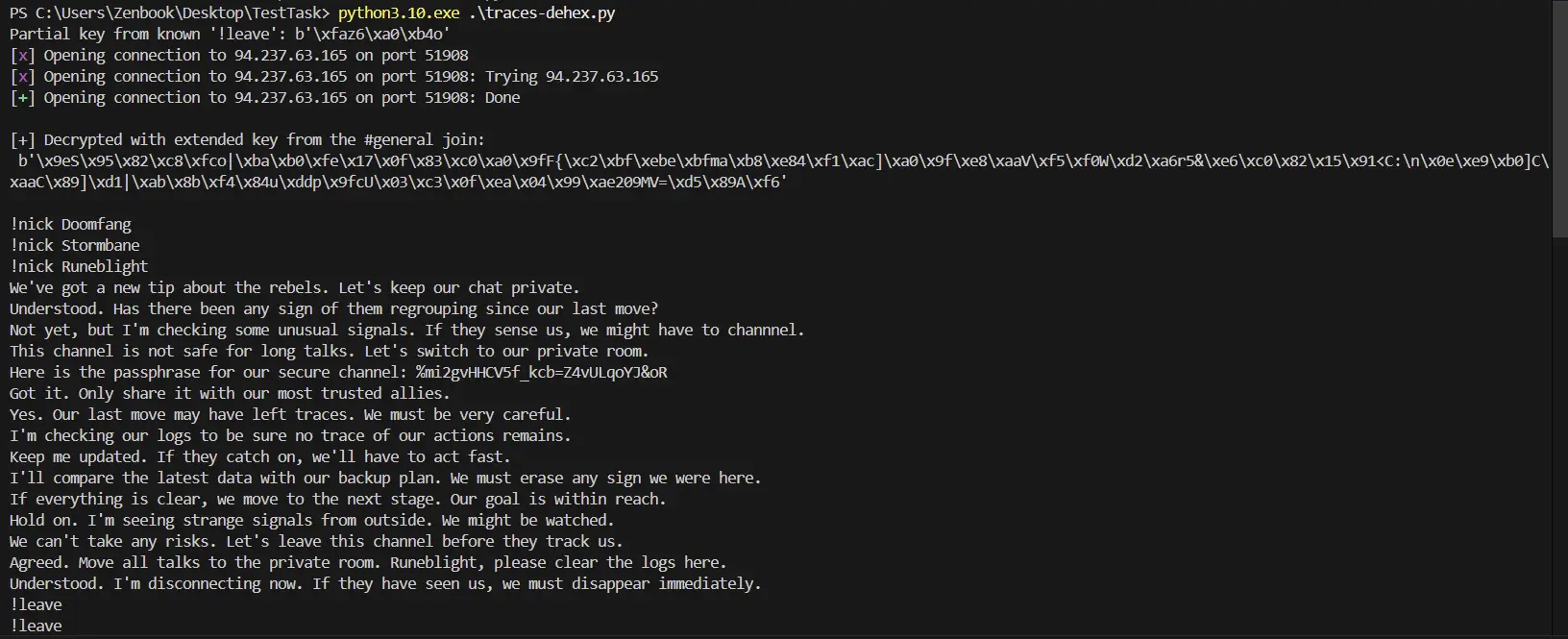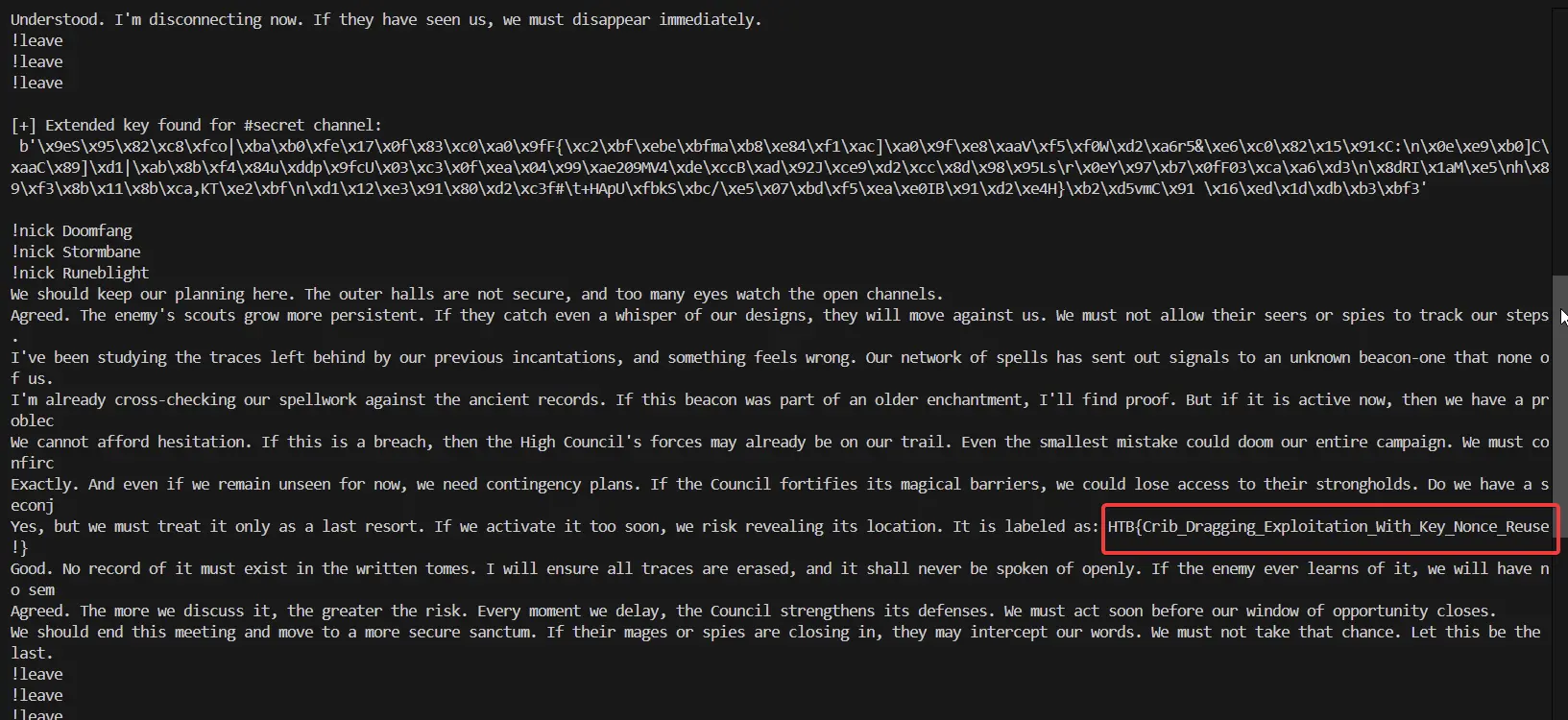🏰 EldoriaNet – XOR Magic and Broken Encryption

Long ago, a sacred message was sealed away, its meaning obscured by the overlapping echoes of its own magic.
The careless work of an enchanter has left behind a flaw—a weakness hidden within repetition.
With keen eyes and sharper wits, can you untangle the whispers of the past and restore the lost words?
server.py
from db import *
from Crypto.Util import Counter
from Crypto.Cipher import AES
import os
from time import sleep
from datetime import datetime
def err(msg):
print('\033[91m'+msg+'\033[0m')
def bold(msg):
print('\033[1m'+msg+'\033[0m')
def ok(msg):
print('\033[94m'+msg+'\033[0m')
def warn(msg):
print('\033[93m'+msg+'\033[0m')
def menu():
print()
bold('*'*99)
bold(f"* 🏰 Welcome to EldoriaNet v0.1! 🏰 *")
bold(f"* A mystical gateway built upon the foundations of the original IRC protocol 📜 *")
bold(f"* Every message is sealed with arcane wards and protected by powerful encryption 🔐 *")
bold('*'*99)
print()
class MiniIRCServer:
def __init__(self, host, port):
self.host = host
self.port = port
self.key = os.urandom(32)
def display_help(self):
print()
print('AVAILABLE COMMANDS:\n')
bold('- HELP')
print('\tDisplay this help menu.')
bold('- JOIN #<channel> <key>')
print('\tConnect to channel #<channel> with the optional key <key>.')
bold('- LIST')
print('\tDisplay a list of all the channels in this server.')
bold('- NAMES #<channel>')
print('\tDisplay a list of all the members of the channel #<channel>.')
bold('- QUIT')
print('\tDisconnect from the current server.')
def output_message(self, msg):
enc_body = self.encrypt(msg.encode()).hex()
print(enc_body, flush=True)
sleep(0.001)
def encrypt(self, msg):
encrypted_message = AES.new(self.key, AES.MODE_CTR, counter=Counter.new(128)).encrypt(msg)
return encrypted_message
def decrypt(self, ct):
return self.encrypt(ct)
def list_channels(self):
bold(f'\n{"*"*10} LIST OF AVAILABLE CHANNELS {"*"*10}\n')
for i, channel in enumerate(CHANNELS.keys()):
ok(f'{i+1}. #{channel}')
bold('\n'+'*'*48)
def list_channel_members(self, args):
channel = args[1] if len(args) == 2 else None
if channel not in CHANNEL_NAMES:
err(f':{self.host} 403 guest {channel} :No such channel')
return
is_private = CHANNELS[channel[1:]]['requires_key']
if is_private:
err(f':{self.host} 401 guest {channel} :Unauthorized! This is a private channel.')
return
bold(f'\n{"*"*10} LIST OF MEMBERS IN {channel} {"*"*10}\n')
members = CHANNEL_NAMES[channel]
for i, nickname in enumerate(members):
print(f'{i+1}. {nickname}')
bold('\n'+'*'*48)
def join_channel(self, args):
channel = args[1] if len(args) > 1 else None
if channel not in CHANNEL_NAMES:
err(f':{self.host} 403 guest {channel} :No such channel')
return
key = args[2] if len(args) > 2 else None
channel = channel[1:]
requires_key = CHANNELS[channel]['requires_key']
channel_key = CHANNELS[channel]['key']
if (not key and requires_key) or (channel_key and key != channel_key):
err(f':{self.host} 475 guest {channel} :Cannot join channel (+k) - bad key')
return
for message in MESSAGES[channel]:
timestamp = message['timestamp']
sender = message['sender']
print(f'{timestamp} <{sender}> : ', end='')
self.output_message(message['body'])
while True:
warn('You must set your channel nickname in your first message at any channel. Format: "!nick <nickname>"')
inp = input('guest > ').split()
if inp[0] == '!nick' and inp[1]:
break
channel_nickname = inp[1]
while True:
timestamp = datetime.now().strftime('%H:%M')
msg = input(f'{timestamp} <{channel_nickname}> : ')
if msg == '!leave':
break
def process_input(self, inp):
args = inp.split()
cmd = args[0].upper() if args else None
if cmd == 'JOIN':
self.join_channel(args)
elif cmd == 'LIST':
self.list_channels()
elif cmd == 'NAMES':
self.list_channel_members(args)
elif cmd == 'HELP':
self.display_help()
elif cmd == 'QUIT':
ok('[!] Thanks for using MiniIRC.')
return True
else:
err('[-] Unknown command.')
server = MiniIRCServer('irc.hackthebox.eu', 31337)
exit_ = False
while not exit_:
menu()
inp = input('> ')
exit_ = server.process_input(inp)
if exit_:
break
📡 Recon
The challenge presented a Python-based IRC-like service, accessible via Netcat:
1337sheets@Zenbook:~$ nc 94.237.63.165 51908
Upon connection, I was greeted by the EldoriaNet v0.1 banner — a fantasy-themed IRC world built on "arcane encryption."

Typing help revealed the available commands. A list command showed two channels: #general and #secret.
> list
********** LIST OF AVAILABLE CHANNELS **********
1. #general
2. #secret
************************************************
> join #secret
:irc.hackthebox.eu 475 guest secret :Cannot join channel (+k) - bad key
Access to #secret was locked. I needed the key.
🔍 Source Code Analysis
After reviewing the provided Python server source code, I discovered two crucial things:
-
Encryption uses AES-CTR with the same key for every message.
def encrypt(self, msg): return AES.new(self.key, AES.MODE_CTR, counter=Counter.new(128)).encrypt(msg)This meant the server was vulnerable to nonce reuse attacks, where XORing ciphertexts could reveal plaintext.
-
To leave a channel, you just type
!leave.if msg == '!leave': break

🧠 The Flaw – Reused Nonce in AES-CTR
AES-CTR mode is essentially a stream cipher: plaintext is XORed with a keystream. If the same key and nonce are used across multiple messages, any ciphertexts can be XORed together to cancel the keystream — leaving you with plaintext XOR plaintext, which is extremely breakable if you guess part of a message.
🛠️ Exploit Script: Decrypting #general and #secret
I wrote this script to automate decryption using known plaintext recovery:
import re
from pwn import *
from binascii import unhexlify
def xor_bytes(a, b):
return bytes(x ^ y for x, y in zip(a, b))
host = "94.237.63.165"
port = 51908
# Recovered a small ciphertext known to correspond to "!leave"
partial_key = xor_bytes(unhexlify('db1653c1c20a'), b'!leave')
print("Partial key:", partial_key)
r = remote(host, port)
# Join #general
r.sendline(b"JOIN #general")
r.recvuntil(b"> ")
data = r.recvuntil(b"guest >").decode()
# Extract all ciphertexts from messages
ciphertexts = re.findall(r':\s([0-9a-fA-F]+)', data)
# Known plaintext assumption for one message
known_plain = b"Not yet, but I'm checking some unusual signals. If they sense us, we might have to channnel."
extended_key = xor_bytes(unhexlify(ciphertexts[5]), known_plain)
print("\n[+] Recovered key from #general:\n", extended_key, "\n")
# Decrypt all general messages
for crypt in ciphertexts:
decrypted = xor_bytes(unhexlify(crypt), extended_key)
print(decrypted.decode())
# Set nick and leave
r.sendline(b"!nick guest")
r.recvuntil(b"> ")
r.sendline(b"!leave")
r.recvuntil(b"> ")
# Join #secret using discovered key
r.sendline(b"JOIN #secret %mi2gvHHCV5f_kcb=Z4vULqoYJ&oR")
r.recvuntil(b"> ")
secret_data = r.recvuntil(b"guest >").decode()
secret_ciphertexts = re.findall(r':\s([0-9a-fA-F]+)', secret_data)
# Another known-plaintext attack on a message from #secret
known_secret = b"I've been studying the traces left behind by our previous incantations, and something feels wrong. Our network of spells has sent out signals to an unknown beacon-one that none of us."
secret_key = xor_bytes(unhexlify(secret_ciphertexts[5]), known_secret)
print("\n[+] Recovered key for #secret:\n", secret_key, "\n")
# Decrypt #secret messages
for crypt in secret_ciphertexts:
decrypted = xor_bytes(unhexlify(crypt), secret_key)
print(decrypted.decode('latin-1'))
r.close()
🔓 Output: Decryption Complete
✅ Decrypting #general:

You can see readable messages once the keystream is recovered.
✅ Joining #secret and Revealing the Hidden Wisdom:

Thanks to the repeated keystream flaw, I was able to fully decrypt #secret and recover the hidden flag/message.
🎯 Takeaway
This challenge is a textbook case of why you should never reuse a nonce or keystream in stream ciphers like AES-CTR. One known plaintext is all it takes to unravel the entire communication.
🔐 Crypto mistake: AES-CTR with reused nonce
🧠 Attack vector: Known plaintext → recover keystream → decrypt everything
🏆 Reward: Full access to a secret IRC channel
Let the enchanter's mistake serve as a reminder: even arcane encryption can crumble in the hands of a careless mage.
🔓✨
